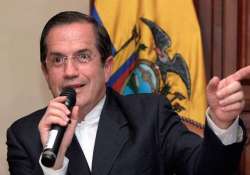Ecuador: Decision on granting asylum to Snowden can take months
Kuala Lumpur, Jan 26: Ecuador today said it would take months to decide on whether to grant asylum to US whistleblower Edward Snowden, currently staying in Moscow airport for the fourth day in a row

Kuala Lumpur, Jan 26: Ecuador today said it would take months to decide on whether to grant asylum to US whistleblower Edward Snowden, currently staying in Moscow airport for the fourth day in a row after fleeing Hong Kong.
Ecuador's Foreign Minister Ricardo Patino, who is here on an official visit, compared Snowden's case to that of WikiLeaks founder Julian Assange, who has been given asylum by is country and is holed up in the Ecuadorean Embassy in London.
Snowden, 30, had blown the lid off National Security Agency's secret spy programme.
"It took us two months to make a decision in the case of Assange, so do not expect us to make a decision sooner this time," Patino told reporters.
Asked if Ecuador would provide protection to Snowden while considering his request for asylum, Patino said if Snowden "goes to the embassy, then we will make a decision."
Patino refused to say what criteria Ecuador would use to decide, but added that his government would "consider all these risks," including concerns that it would hurt trade with the US and his country's economy.
Snowden is charged with violating American espionage laws.
He is currently in Russia after fleeing from Hong Kong.
Russian President Vladimir Putin had yesterday said Snowden is in the transit zone of Moscow's Sheremetyevo Airport. He has rejected US pleas to turn him over.
Snowden worked as a Hawaii-based computer network administrator for Booz Allen Hamilton before he fled to Hong Kong last month with laptops full of confidential information.
He told UK's Guardian newspaper that he exposed the US surveillance programmes because they pose a threat to democracy.
He claimed his intention was to collect information about the NSA hacking into "the whole world".
The documents revealed the existence of programmes that collect records of domestic telephone calls in the US and monitor the internet activity of overseas residents.
The disclosures shook the US intelligence community and raised questions about whether the NSA is eroding American civil liberties.
Snowden is charged with theft of government property, unauthorised communication of national defence information and wilful communication of classified communications intelligence.
Snowden has applied for asylum in Ecuador. The US has revoked his passport.
Ecuador's Foreign Minister Ricardo Patino, who is here on an official visit, compared Snowden's case to that of WikiLeaks founder Julian Assange, who has been given asylum by is country and is holed up in the Ecuadorean Embassy in London.
Snowden, 30, had blown the lid off National Security Agency's secret spy programme.
"It took us two months to make a decision in the case of Assange, so do not expect us to make a decision sooner this time," Patino told reporters.
Asked if Ecuador would provide protection to Snowden while considering his request for asylum, Patino said if Snowden "goes to the embassy, then we will make a decision."
Patino refused to say what criteria Ecuador would use to decide, but added that his government would "consider all these risks," including concerns that it would hurt trade with the US and his country's economy.
Snowden is charged with violating American espionage laws.
He is currently in Russia after fleeing from Hong Kong.
Russian President Vladimir Putin had yesterday said Snowden is in the transit zone of Moscow's Sheremetyevo Airport. He has rejected US pleas to turn him over.
Snowden worked as a Hawaii-based computer network administrator for Booz Allen Hamilton before he fled to Hong Kong last month with laptops full of confidential information.
He told UK's Guardian newspaper that he exposed the US surveillance programmes because they pose a threat to democracy.
He claimed his intention was to collect information about the NSA hacking into "the whole world".
The documents revealed the existence of programmes that collect records of domestic telephone calls in the US and monitor the internet activity of overseas residents.
The disclosures shook the US intelligence community and raised questions about whether the NSA is eroding American civil liberties.
Snowden is charged with theft of government property, unauthorised communication of national defence information and wilful communication of classified communications intelligence.
Snowden has applied for asylum in Ecuador. The US has revoked his passport.